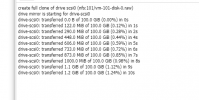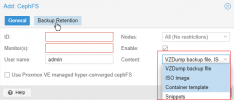Importing virtual machine disks on Proxmox ve Gui is very slow, only 40-150MB/s, but I can directly use the rbd command to import the speed to reach 340MB/s, so is there any need to optimize? Similar to the problem of glance
https://bugs.launchpad.net/glance/+bug/1390386
https://bugs.launchpad.net/glance/+bug/1390386



